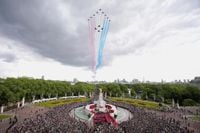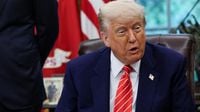Former President Donald Trump has declared two new national holidays to commemorate U.S. victories in World War I and World War II, sparking discussions about the significance and implications of these proclamations. On May 5, 2025, Trump announced on his social media platform, Truth Social, that the United States would celebrate these victories on November 11 and May 8, respectively. This declaration, however, has raised questions about the nature of these holidays and their official status.
In his post, Trump stated, "We won two World Wars, but we never took credit for it — Everyone else does!" He emphasized that the U.S. played a crucial role in these conflicts and that it was time to recognize that contribution. The proclamation specifically designates November 11 as a day to celebrate the victory in World War I, where the Armistice was signed on November 11, 1918, and May 8 as a day for World War II, recognizing the acceptance of Germany's unconditional surrender in 1945.
Despite the enthusiasm surrounding these declarations, it is important to note that they do not establish official federal holidays. According to U.S. law, only Congress has the authority to create or modify federal holidays. Therefore, while Trump can proclaim a day of observance, it does not confer the same status as established federal holidays such as Independence Day or Memorial Day.
On May 8, 2025, Trump issued a proclamation on the White House website, designating the date as "Victory Day for World War II, 2025." He stated, "NOW, THEREFORE, I, DONALD J. TRUMP, President of the United States of America, by virtue of the authority vested in me by the Constitution and the laws of the United States, do hereby proclaim May 8, 2025, as a day in celebration of Victory Day for World War II." This day is recognized in various countries as Victory in Europe Day, or V-E Day, marking the end of hostilities in Europe during WWII.
Trump's announcement also included a notable caveat: he clarified that the country would not be closed for these holidays. "We will not be closing the Country for these two very important Holidays, November 11 and May 8, World War I and World War II, because we already have too many Holidays in America," he stated. This remark reflects a broader sentiment that the U.S. has a crowded holiday calendar and that additional official holidays may not be feasible.
While the proclamations aim to honor the sacrifices made during these global conflicts, they also highlight the complexities surrounding national holidays. For instance, Veterans Day, which falls on November 11, is already recognized as a federal holiday celebrating all military veterans. This raises the question of whether Trump's proposed holiday for World War I would simply duplicate the existing Veterans Day observance.
In a related note, May 8 is not recognized as a federal holiday, and Trump's declaration does not translate into a day off for federal employees or the general public. Banks, post offices, and the stock market are expected to remain open, and many Americans will continue their regular work schedules on that day.
Trump's declarations come at a time when discussions about national identity and historical recognition are particularly poignant. The former president's emphasis on the U.S. role in the world wars resonates with a segment of the population that feels American contributions to global conflicts are often overlooked. As he noted, "The only Country that doesn’t celebrate is the United States of America, and the Victory was only accomplished because of us." This sentiment is echoed in various media narratives that seek to highlight America's historical significance.
Interestingly, the timing of Trump's announcement coincided with the selection of Cardinal Robert F. Prevost as Pope Leo XIV on May 8, 2025. This event, which marks the first American pope, adds another layer of significance to the date, although it is unrelated to the World War II commemorations. Trump's congratulatory message to the new pope also drew attention, as it underscored the intertwining of politics and religion in contemporary discourse.
While the proclamations may not lead to immediate changes in how holidays are observed in the U.S., they reflect ongoing conversations about national pride and historical acknowledgment. The idea of recognizing pivotal moments in history resonates with many Americans, particularly as global commemorations for events like V-E Day continue to take place.
In summary, Trump's declaration of May 8 and November 11 as days to celebrate victories in World War I and II has sparked both interest and skepticism. While the proclamations aim to honor historical events, they do not change the status of these dates as federal holidays. As discussions continue, the impact of such announcements on national identity and memory remains to be seen.






